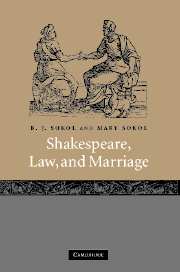Book contents
- Frontmatter
- Contents
- Acknowledgments
- List of abbreviations: Shakespeare titles
- Introduction
- 1 Making a valid marriage: the consensual model
- 2 Arranging marriages
- 3 Wardship and marriages enforced by law
- 4 Financing a marriage: provision of dowries or marriage portions
- 5 The solemnisation of marriage
- 6 Clandestine marriage, elopement, abduction, and rape: irregular marriage formation
- 7 The effects of marriage on legal status
- 8 Marriage breakdown: separation, divorce, illegitimacy
- 9 'Til death us do part
- An afterword on method
- Notes
- Bibliography
- Index
Introduction
Published online by Cambridge University Press: 22 September 2009
- Frontmatter
- Contents
- Acknowledgments
- List of abbreviations: Shakespeare titles
- Introduction
- 1 Making a valid marriage: the consensual model
- 2 Arranging marriages
- 3 Wardship and marriages enforced by law
- 4 Financing a marriage: provision of dowries or marriage portions
- 5 The solemnisation of marriage
- 6 Clandestine marriage, elopement, abduction, and rape: irregular marriage formation
- 7 The effects of marriage on legal status
- 8 Marriage breakdown: separation, divorce, illegitimacy
- 9 'Til death us do part
- An afterword on method
- Notes
- Bibliography
- Index
Summary
Shakespeare, in common with many of his fellow dramatists and with his society in general, was fascinated by law. His and other Elizabethan drama also focused a great deal of attention on complex, often legal, issues surrounding contemporary marriage. So the subject of the present study – Shakespeare, law, and marriage – is a large one.
Before turning to matters having specific bearing on that subject, this Introduction will outline some of the historical reasons for the great importance of the law of marriage, and indeed law in general, in everyday Elizabethan life. Observations of the litigiousness of Shakespeare's age will lead to descriptions of some of the more important jurisdictions active in the period. We will then offer examples (chosen because reflected by Shakespeare) of some of the innovations made by Elizabethan jurisdictions, and some of the dynamically changing relations between them. The impression we hope to convey is that of a legal situation that was not static, but which rather expressed the pressing social desires and needs of the age.
OUR PURPOSES
There are now new possibilities and a new need for a study of Shakespeare, law, and marriage. Shakespeare scholars are increasingly interested in the insights that can be gained by studying the laws and legal institutions of Shakespeare's world. We welcome this development, and indeed hope to contribute to it and to demonstrate its advantages in practical ways.
- Type
- Chapter
- Information
- Shakespeare, Law, and Marriage , pp. 1 - 12Publisher: Cambridge University PressPrint publication year: 2003

